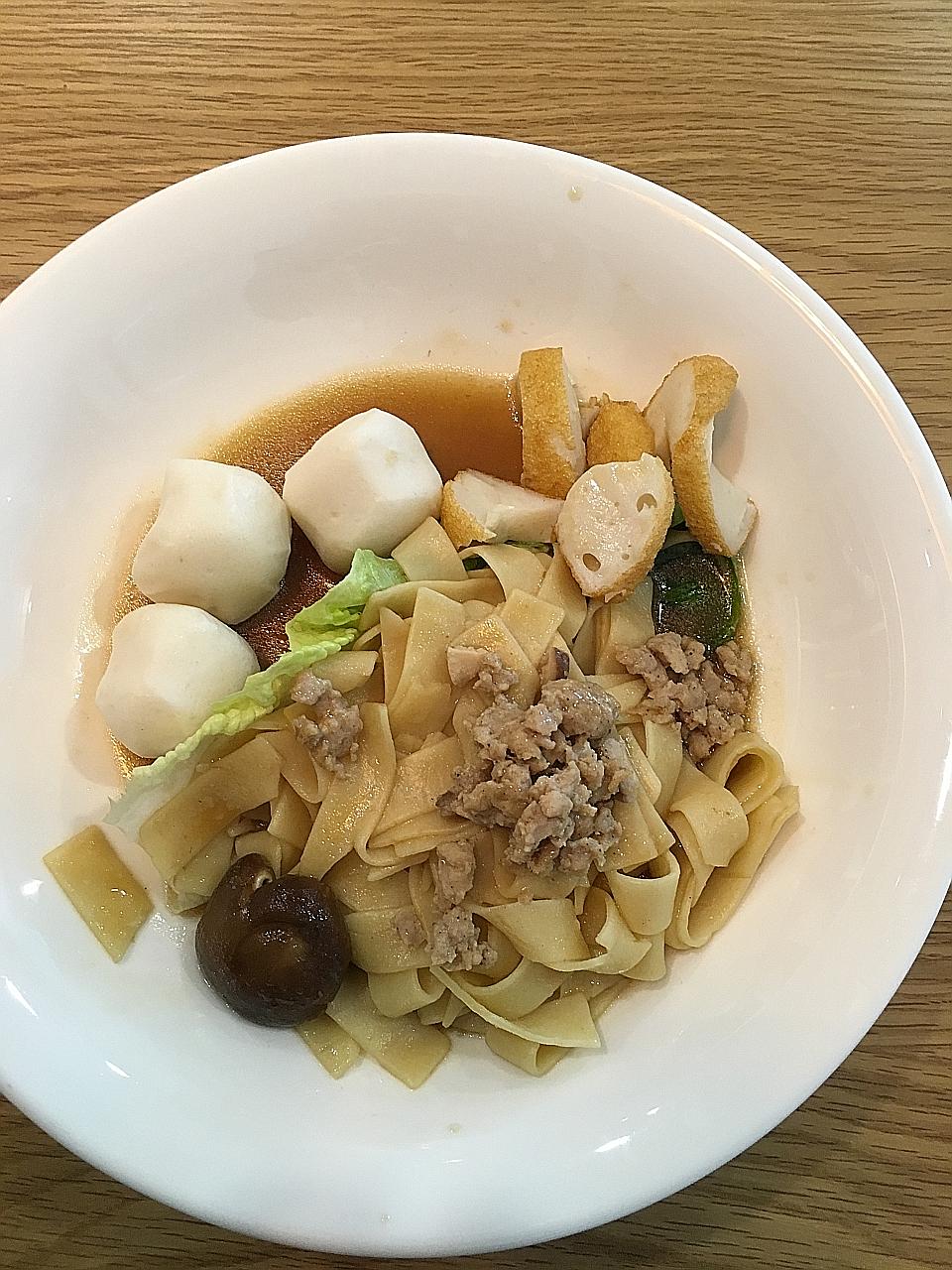Lunch With Sumiko
Lunch With Sumiko: Against the odds, Jason Chee triumphs
Navy man Jason Chee doesn't let obstacles get in his way of living life with optimism
Sign up now: Get ST's newsletters delivered to your inbox
Jason Chee removes his glasses and shows me his right eye.
"What you see now is the plastic lens," he says. The lens allows his eye to open and close, he explains.
I peer more closely but all I can see is a sliver of something white, reddish and raw between his eyelids.
"It's red," I say.
"Yah, the red is the meat. Once the eyeball is removed, what you see is the meat of the red muscle."
Does it hurt?
No, it doesn't hurt, he says, putting his glasses back on.
Will you still be able to swim?
He says he doesn't know because he hasn't asked.
"I'm going to have my personal prosthetic eye soon, next month," he continues.
What exactly is a prosthetic eye, I wonder.
He explains that it is like a contact lens painted to look like his other eye. "It's like real - the same. Match the colour of the iris, everything." He will also be able to look left and right because the prosthetic eye can move.
We're having lunch at the Mystical Cafe For All, a cosy eatery in the Kembangan-Chai Chee Community Hub run by the Association for Persons with Special Needs (APSN).
The venue was chosen by the Singapore Disability Sports Council, which helped to arrange our meeting.
Minutes earlier, the 34-year-old navy serviceman and national para-athlete was explaining to me what phantom limb pain is like.
Basically, it is pain where his legs and left arm used to be before they were amputated.
The sensation is like an electric shock. Pointing to the stump that used to be his left arm, he says: "It will move, vibrate."
By itself?
Yah, he says, by itself.
The stumps where his legs were removed will also shake.
But, he adds, he doesn't suffer from phantom pain anymore.
I'd seen a video of him using prosthetic legs and wonder if he uses them. He says he does, but keeps them for short distances when he is at work.
"My legs are in my cubicle in my work office," he adds.
It can take him 10 minutes to cover 25m with the prosthetic legs. "So if I want to travel 1km, you can imagine the time taken. It's going to be two to three hours." It's much faster to use his wheelchair, which can go up to a speed of 12kmh.
OUR conversation is not what one ordinarily has during lunch, but Chee has had an extraordinary life.
In December 2012, the Republic of Singapore Navy weapons systems supervisor had a horrific accident on board the RSS Endeavour at Changi Naval Base.
He was caught between a motorised winch and a berthing rope, and both his legs, his left arm and three fingers of his right hand had to be amputated.
But he survived, recovered and went back to work in the navy. He also took up competitive table tennis for the disabled.
Because he had been left-handed and that arm was now gone, he had to learn to use his right arm to play.
But he excelled in the sport, made it to the national team and won team medals at regional events.
In April this year, while preparing for the Asean Para Games in September, he discovered that he had cancer of the right eye.
He had an operation to remove his right eyeball, and went back to training.
This time, he had to adapt his playing style because his depth perception was affected by the loss of the eye. Every time the ball comes towards his right side, he has to turn his neck to the right to see it.
Two weeks ago, he won his first individual men's gold at the Asean Para Games in Kuala Lumpur.
As he punched his fist in the air in victory, the one thought on his mind was, "mission accomplished".
What made the victory even sweeter was how Chee beat the same Thai opponent whom he had lost to at the 2015 Asean Para Games - when he was fully sighted.
"Even my eye specialist told me to change sports because playing table tennis with one-eyed vision is quite uncomfortable," he says.
"But I told the specialist that I'm not giving up on table tennis. I have played it for so many years, why do I want to give up so easily? So I don't give up. And I proved the doctors wrong. I'm still playing. I got the medal."
The once burly man likens the challenges he has faced to a "navy warship going through sea state with big waves coming".
"I got two waves. First is losing my limbs. The second wave is the right eye. But I have to go through these waves, to overcome them," he says.
"Even though so many things happen to me, importantly I still can see what is in front of me. I can see a rainbow, I can see the sun, I can see the moon. I mean, I'm still alive lah. I cherish every moment."
He says all this matter-of-factly, without any drama or show.
Chee arrives for lunch in the motorised wheelchair with his caregiver Nonie Maghirang, 34. They had come by MRT and he's wearing a Team Singapore polo-shirt.
He manoeuvres his wheelchair to the table and apologises for sounding hoarse. He has been nursing a bad sore throat.
He fishes out from his navy camouflage bag three framed photos of his recent Asean Para Games victory, as well as a box containing his gold medal and another bronze he won for the men's team event.
He reveals that he has just bought a cabinet for his Shunfu home where he will display his sporting trophies and medals. Pointing to the Para Games medal, he says approvingly: "Royal Selangor. Good quality."
We both opt for the bak chor mee - the version here is made with fettuccine - and he gets warm water with lemon for his throat.
Because he's not self-conscious about his disabilities, you soon don't notice them too.
He has always loved sports, he says, and swam, cycled and played badminton, football and even cricket. He learnt table tennis when he was young and represented Westlake Primary School in the sport.
He has always been a fan of national paddler Feng Tianwei, whom he cites as an inspiration. Today, she gives him tips on his game.
In past interviews as well as at our lunch, he talks a lot about his mother, Madam Chua Ah Lek, a seamstress who died of kidney problems in 2011 at the age of 65.
She was a serious, no-nonsense woman who gave him - her only child - swimming lessons when he was three and made him learn the electric organ, computer and taekwondo.
She was an avid cook with a library of cookbooks. Her rice dumplings, he says with a smile, were the best. "I still can smell it. The taste - very delicious."
She would make him accompany her when she attended cooking lessons at community centres.
"I always asked my mum, 'Why you bring me to learn swimming, why you bring me to all this?' She told me, 'Son, I want you to learn more things so that you won't lose to anyone.' "
From his Shanghainese father, Mr Chee Kwok Chor, 76, a vegetable seller, he learnt what hard work means.
His father, whom he lives with, would leave the house at 11.30pm to collect vegetables at Pasir Panjang Wholesale Centre, then sell them at a Jalan Besar stall till 1pm the next day.
"He did this for more than 40 years. Me and my late mum asked him to go on holiday with us, but his work was more important. I learnt perseverance from him."
At Guangyang Secondary, Chee joined the Boys' Brigade. He has always liked uniforms and loved the marching segment of the National Day Parade. "I always told my mum, wow, their uniform so nice, so smart, their marching is so nice, can I be like them one day? My mum listened until sian already."
The Ngee Ann Polytechnic graduate signed on with the navy because "I love the sun and the sea, I love to travel around onboard the warships and go on overseas exercises".
Chee attributes much of his stoic, determined outlook in life to his mother's influence.
"When I was small, I did not cry easily. I was more a determined person. This was what my late mum taught me - how to be an upright person, not to give up easily."
When he was recovering from the navy accident, he willed himself to wean off the painkillers. "The nurse asked me, 'You want to take painkiller?' I said, 'I can tolerate, just endure.' "
He took the same approach dealing with the phantom limb pain after his amputations. "I just told myself not to think about having the limbs. It took three, four months."
And when he learnt he had eye cancer, he went about things calmly, seeking a second opinion and reading up on choroidal melanoma before agreeing that surgery was the best option.
While the cancer is gone, he has to follow up with checks for the next five years.


What we ate
APSN Mystical Cafe For All, 11 Jalan Ubi Block 4, #01-31
2 Fettuccine bak chor mee: $10
2 Peanut butter cheese tart: $11
1 New York cheese cake: $5.50
1 Nanyang tea: $3.40
Total: $29.90
HIS days are packed. He has a desk-bound job as a training specialist at Changi Naval Base. He does table tennis training several nights a week, and attends classes at the Singapore University of Social Sciences on Friday nights, where he is doing a degree in mathematics. He travels by bus and MRT.
On weekends, he spends time with his family and does volunteer work. He believes that sports is a way to get the disabled out and about, and he visits hospitals to encourage amputees to do so.
I ask what his five-year plan is and he says it's to finish his degree in 2019/2020, and to continue with his navy career and his table tennis.
For the longer term, he hopes to get married and have children.
Do you have a girlfriend? He laughs heartily at this and says yes, but doesn't want to say too much.
But he does share that they have been going out for four months. They met in Singapore and he adds: "I cherish her a lot, I care for her. I mean, I bring glory to her. She takes care of me. We support each other."
The misfortunes that have befallen him are enough to make anyone feel bitter and bereft, but he has no time for self-pity.
"I never think about being sorry for myself. I mean, life moves on. I only live once, everyone lives once. There are people who have more disability than me, such as stroke patients. They are bedridden, they can't move out from the bed, they can't talk. I still can move around, I still have my right arm."
Our bak chor mee is long gone and we get dessert. He polishes off two pieces of cheesecake and asks for more warm water for his throat.
He has an appointment at the Singapore National Eye Centre and heads to the MRT station.
His travails have exposed him to challenges, but they have also opened his world to more people and experiences.
Through it all, he hasn't changed, he says. "My school friends say that I'm still the same old Jason, happy-go-lucky," he says. "They treat me as normal. I also treat myself as a normal person."
Twitter @STsumikotan


